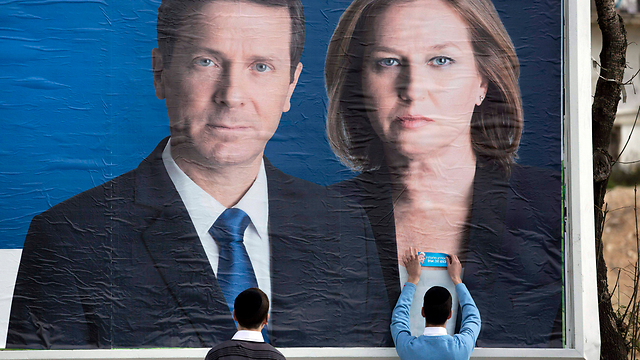
Netanyahu in Likud election ad. Failed to create a real political agenda
The roller coaster of election polls
Op-ed: Israel's political parties are beginning to realize that the public isn't fooled by their spins and slogans; the upcoming elections will be determined by their agenda.
The great political upheaval took place in 1977. The Herut-Liberals bloc (which later became the Likud) rose to power after about 30 years of Mapai rule.

The media wrote about the two big winners: Menachem Begin, the leader of the Herut-Liberals, and Eliezer Jorabin, the director of the Dahaf advertising agency, who ran the campaign. He was the one who invented the "Koach Ehad" ("One Force") slogan, which succeeded in throwing Shimon Peres and his friends into the opposition seats.
The members of the Alignment (which later became the Labor Party) were not born yesterday, and ahead of the 1981 elections they hired Jorabin's services. Those days it was considered a great drama, like a footballer moving from one team to the rival one. The Herut-Liberals bloc was forced to settle for the services of the Kesher-Barel agency, but Begin won again.
The Alignment did not despair, and ahead of the 1984 elections it hired the services of Kesher-Barel, the new star in the world of political advertising. That didn’t help either, and despite the Lebanon War and the galloping inflation, Peres settled for creating a unity government. Which means that advertising agencies don't win election campaigns.
In the current elections, the parties are spending millions of shekels on their campaign. New slogans are meant to bring about the big change. For example, Labor's winning slogan, "It's either us or him," and the Likud's crushing response, "It’s either us or them." Well, who are you in favor of: Us, him or them?
What does win an election campaign? The political agenda, it seems. In 1977, the elections were determined by the Yom Kippur War failure, which crushed the Alignment's security image, the ethnic protest which caused the Sephardim to move over to Begin's side, and the corruption cases exposed among senior members of the ruling party.

Zionist Camp election ad. 'The battle will be fought in the media coverage, not through empty slogans' (Photo: EPA) (צילום: EPA)
The ethnic protest reached its peak in the 1981 elections following entertainer Dudu Topaz's comments against the "chahchahim" (a derogatory slang word alluding to Israeli Jews of Middle Eastern background) and the reinforcement of the right's security image following the bombing of the Iraqi nuclear reactor.
In 1984, the Likud lost seven Knesset seats for sinking into the Lebanese mud and the banking crisis. The Alignment also lost three Knesset seats for failing to provide a response to the ethnic issue. The same conclusion can be reached about the rest of the election campaigns – the political, military and social agenda determined the results.
Following the surveys in the current elections reveals a similar trend. When Prime Minister Benjamin Netanyahu decided to dissolve the government, he failed to create a real political agenda. The security issue was perceived as calm and his attempt to invent an economic agenda (promising zero VAT on basic products) and a governance agenda (changing the election system) was perceived as an election stunt. On this background, Isaac Herzog and Tzipi Livni's Zionist Camp grew stronger, offering a more appealing social agenda.
Early last week, Netanyahu succeeded in creating a security-related agenda thanks to his scheduled Congress speech and the events in Lebanon which led to a four-seat advantage over the Zionist Camp. The revelation of testimonies about corruption in the prime minister's residence gave Herzog and Livni and advantage of one Knesset seat over the Likud in Mina Tzemach's weekend poll.
Bayit Yehudi Chairman Naftali Bennett realized that the settlers in his party are not interested in the social agenda he tried to create by bringing in footballer Eli Ohana and that they are spilling over to Eli Yishai's Yachad party.
Yisrael Beytenu Chairman Avigdor Lieberman, who lost Knesset seats in the polls, shifted back to the right, and Shas Chairman Aryeh Deri, who realized that the social-economic agenda had already been taken by Moshe Kahlon, announced that he would not join a left-wing government.
The roller coaster of election polls will continue until March 17. The parties are beginning to realize that the illusions of spins and slogans are not fooling the public. The upcoming election campaign will be determined by its agenda. This battle will be fought in the media coverage in newspapers and on television, not through empty slogans in ads and on billboards.










